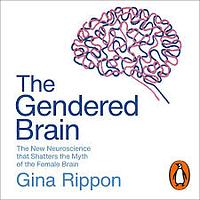You need to sign in or sign up before continuing.
Take a photo of a barcode or cover
227 reviews for:
The Gendered Brain: The New Neuroscience That Shatters the Myth of the Female Brain
Gina Rippon
227 reviews for:
The Gendered Brain: The New Neuroscience That Shatters the Myth of the Female Brain
Gina Rippon
informative
medium-paced
challenging
informative
inspiring
reflective
medium-paced
slow-paced
informative
slow-paced
informative
reflective
medium-paced
There were a lot of really interesting (and disturbing) studies discussed in this book. I like that the author was able to explain the science in an accessible way. She also didn't firmly plant herself 8n the 'no sex differences" category and instead chose to emphasize that we simply don't know enough at this point in time, which I think was important. For the record, I don't believe there are significant sex differences in our brains lol at least not ones that determine ability.
My complaint is that the book got really, really repetitive after a while. I felt like I was rereading about the same studies over and over. I also wish she had brought up that sex/gender dichotomy isn't even an accurate categorization much earlier.
Overall interesting, but could have been shorter and incorporated more than 2 sex/genders sooner.
My complaint is that the book got really, really repetitive after a while. I felt like I was rereading about the same studies over and over. I also wish she had brought up that sex/gender dichotomy isn't even an accurate categorization much earlier.
Overall interesting, but could have been shorter and incorporated more than 2 sex/genders sooner.
The first third of Gender and Our Brains would get four or five stars. Rippon's evisceration of classic gender myths and the shitty studies that support them is well-worth the read.
Unfortunately, the latter two-thirds of the book felt aimless and at times, self-contradictory. For example, early in the book Rippon casts serious doubt upon the usefulness of fMRI studies — pointing out that fMRIs are easy to fudge and that the whole idea of particular areas of the brain being responsible for particular things is misguided. But later on, Rippon uncritically refers to more than one fMRI study that supports her point. These discrepancies were at first confusing, then disappointing, and eventually kind of irritating.
Unfortunately, the latter two-thirds of the book felt aimless and at times, self-contradictory. For example, early in the book Rippon casts serious doubt upon the usefulness of fMRI studies — pointing out that fMRIs are easy to fudge and that the whole idea of particular areas of the brain being responsible for particular things is misguided. But later on, Rippon uncritically refers to more than one fMRI study that supports her point. These discrepancies were at first confusing, then disappointing, and eventually kind of irritating.
challenging
informative
slow-paced
I read (or rather listened to) this as part of the Genre Reading Challenge. Psychology/Science is definitely not a subject I normally touch, although I’m interested in the subject matter of this particular book – Gender. I can’t say I took everything in but I’m glad I finished it.
This is the first book that really impressed upon me the importance of looking under the bonnet of quoted scientific studies to understand how they were setup and how researchers’ biases and wish to get the ‘right’ answer might compromise the validity of outcomes – in the past I often trusted well respected media outlets and papers to do that for me. Shockingly, however, the book highlights how even respected scientific journalists do not necessarily look close enough and the damage that it can leave in its wake can be long-lasting. Which is why learning about so-called Neurotrash and the value of neuro-scepticism has been so fascinating and encouraged me to be more cautious – for the first time in my life I’m now investigating the references in the book (including this one!).
Understanding neuroscience and how it is presented to the public, especially in relation to gender, was the first part of the book and whilst I found it well-informing and educational, it was a bit of a slow burn with a couple of poorly laid out theories (e.g. allusion to PMS being a thing only in the western world)– they were just dropped there without further follow-up or nuanced explanation.
The book really comes into its own in the second half when it explores the brains of babies and children and really delves into how neuroplasticity shapes how we think and perceive ourselves and that the behaviours and attitudes we exhibit individually are more likely influenced by social conditioning as opposed to any pre-determined biological factors. The book took great care to debunk a lot of damaging ‘wack-a-mole’ theories that keep resurfacing in the press even if the studies that they quoted had been widely disproved.
Overall, the book highlights how looking for gender differences in neuroscience is just the wrong tree to bark at – we are products of our environment and experiences and, therefore, we should ask more nuanced and multi-layered questions about how we behave and think in the context of social, economic, political and cultural influences instead of keep flogging that dead horse of biological determinism when it comes to gender differences.
Understanding neuroscience and how it is presented to the public, especially in relation to gender, was the first part of the book and whilst I found it well-informing and educational, it was a bit of a slow burn with a couple of poorly laid out theories (e.g. allusion to PMS being a thing only in the western world)– they were just dropped there without further follow-up or nuanced explanation.
The book really comes into its own in the second half when it explores the brains of babies and children and really delves into how neuroplasticity shapes how we think and perceive ourselves and that the behaviours and attitudes we exhibit individually are more likely influenced by social conditioning as opposed to any pre-determined biological factors. The book took great care to debunk a lot of damaging ‘wack-a-mole’ theories that keep resurfacing in the press even if the studies that they quoted had been widely disproved.
Overall, the book highlights how looking for gender differences in neuroscience is just the wrong tree to bark at – we are products of our environment and experiences and, therefore, we should ask more nuanced and multi-layered questions about how we behave and think in the context of social, economic, political and cultural influences instead of keep flogging that dead horse of biological determinism when it comes to gender differences.
This book was incredibly fascinating and is grat to dip into several areas of neurology and psychologye
I think it could have been much more effective if it were shorter, I found there was much repetition in the topics covered. I'm don't know much about neuroscience but I'm sceptical of the accuracy of some claims. I was also getting a sense that the author has radical feminist views.
On a positive note the writing, when not repetative is clear. The take away I got is that stereotyping leads to the perpetuation of stereotypes. If we want to truly understand the brain we need to be able to clear away stereotypes.
On a positive note the writing, when not repetative is clear. The take away I got is that stereotyping leads to the perpetuation of stereotypes. If we want to truly understand the brain we need to be able to clear away stereotypes.




